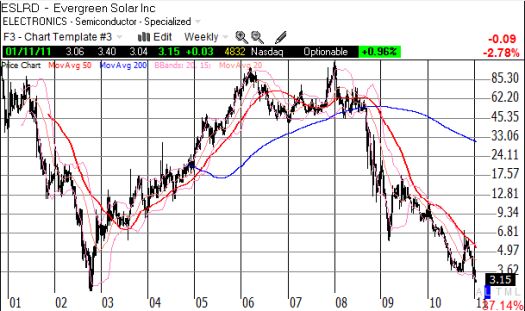During the last earnings conference call for Evergreen Solar (ESLR), management claimed that the company had the resources to meet its liquidity needs and had enough cash to sustain current and planned burn rates. A little over two months later, ESLR has announced that it is retrenching and shutting down its manufacturing facility in Devens, Massachusetts in part to “…preserve the Company’s liquidity…[and] help preserve cash.” In the announcement, management noted that throughout 2010 it reminded investors that it “…would continue to manufacture in Devens as long as it was economically feasible.” However, the clearest hint of management’s proximity to a shutdown decision came with a frustrated response to U.S. trade sanctions targeted at Chinese dumping of aluminum extrusion products (used in solar frames as well as many other products). I wrote at the time:
“This action means that ESLR’s material costs will increase over the next three months as the company scrambles to secure alternate suppliers. ESLR explained that it is like any other U.S. manufacturer that finds it necessary to source material outside of the U.S. in order to remain competitive. Management lamented that the government’s action may eventually force ESLR to move more (all?) assembly outside of the U.S. so that the company could continue to access cheap Chinese aluminum extrusion.
Management was very vocal in expressing its frustration over this trade action. They claimed they will pleading their case with politicians from state legislators, to the governor of Massachusetts, to politicians in Washington, D.C. I expect their efforts to fail; this issue is likely intractable. Even if ESLR can make a case that these punitive duties will cost valuable Americans jobs at its Devens facility, the petitioners that initiated this action will outweigh ESLR’s concerns with their own claims about the jobs their plants and industries are losing to the cheap Chinese product. These petitioners have already received the welcome ear of the government.”
So, just as LDK Solar’s impressive increase in sales guidance rekindled upward momentum in solar stocks, ESLR’s warning of increasing price competition (despite expectations for increasing demand) seems primed for dampening the party just a little:
“…we expect that significant capacity expansions in low cost manufacturing regions combined with potential adverse changes in government subsidies in several markets in Europe will likely result in continuing pressure on selling prices throughout 2011…During the month of December, we experienced a 10% decrease in average selling prices from the beginning of the fourth quarter. As industry selling prices continue their rapid declines into 2011, panel manufacturing in Devens, either fully or partially, is no longer economically feasible…”
ESLR also expressed pessimism regarding the prospects for solar manufacturing in the U.S.:
“…Solar manufacturers in China have received considerable government and financial support and, together with their low manufacturing costs, have become price leaders within the industry. While the United States and other western industrial economies are beneficiaries of rapidly declining installation costs of solar energy, we expect the United States will continue to be at a disadvantage from a manufacturing standpoint…Although production costs at our Devens facility have steadily decreased, and are now below originally planned levels and lower than most western manufacturers, they are still much higher than those of our low cost competitors in China.”
This plant closure also points a spotlight on the failure of Massachusetts to generate success through the force of government largess. Governor Deval Patrick bet big on ESLR with $58 million in subsidies that included “$21 million in grants and $22.6 million in tax incentives, as well as a $1-per-year lease for the 23 acres.” (see “Plant will shut after $58m in state aid: Evergreen Solar to cut 800 jobs as it tries to compete with China” at boston.com). ESLR also received a $5 million loan, and the state granted $13 million for infrastructure improvements.
This package of subsidies was one of the biggest ever awarded to a private company by the state of Massachusetts. Naturally, the Governor felt compelled to defend the investment in the wake of this abrupt news. The Boston Herald reported the following statement:
“We worked real hard to build up this company, and I’m delighted that we’ve had four years of 900 jobs. But I am obviously disappointed that we’re going to lose 800 of those jobs, and I’m about fighting for every one of those jobs…”
Apparently, this generosity did come with some strings attached. The state included clawback provisions if ESLR failed to live up to its commitments to create and maintain jobs at the plant. While ESLR did not directly reference these costs in its press release, boston.com reported that management expects to return $3-4M to Massachusetts taxpayers. This is a very small sum compared to the overall subsidy and an even smaller sum compared to over $500M in charges and related costs that ESLR will record in closing Devens. The Boston Herald reported that state officials insisted they will recover a “significant portion” of the subsidy, so a legal fight is probably over the horizon that could add to ESLR’s costs.
The costs to holders of ESLR stock will also increase as the company takes this drastic step in its continued struggle for survival. The stock is teetering near all-time lows as the company transitions through a reverse stock split and gets ready to execute a dilutive recapitalization plan.

*Chart created using TeleChart:

ESLR attempted to adorn the bad news with some encouraging words about technological advancements toward creating industry standard size wafers and record shipments in the fourth quarter. But we have heard this song before. As Evergreen Solar gears up to challenge its Chinese competitors, the company will have to build up a lot more muscle…and fast. Time continues to tick away…
Be careful out there!
Full disclosure: long ESLR (ESLRD)
